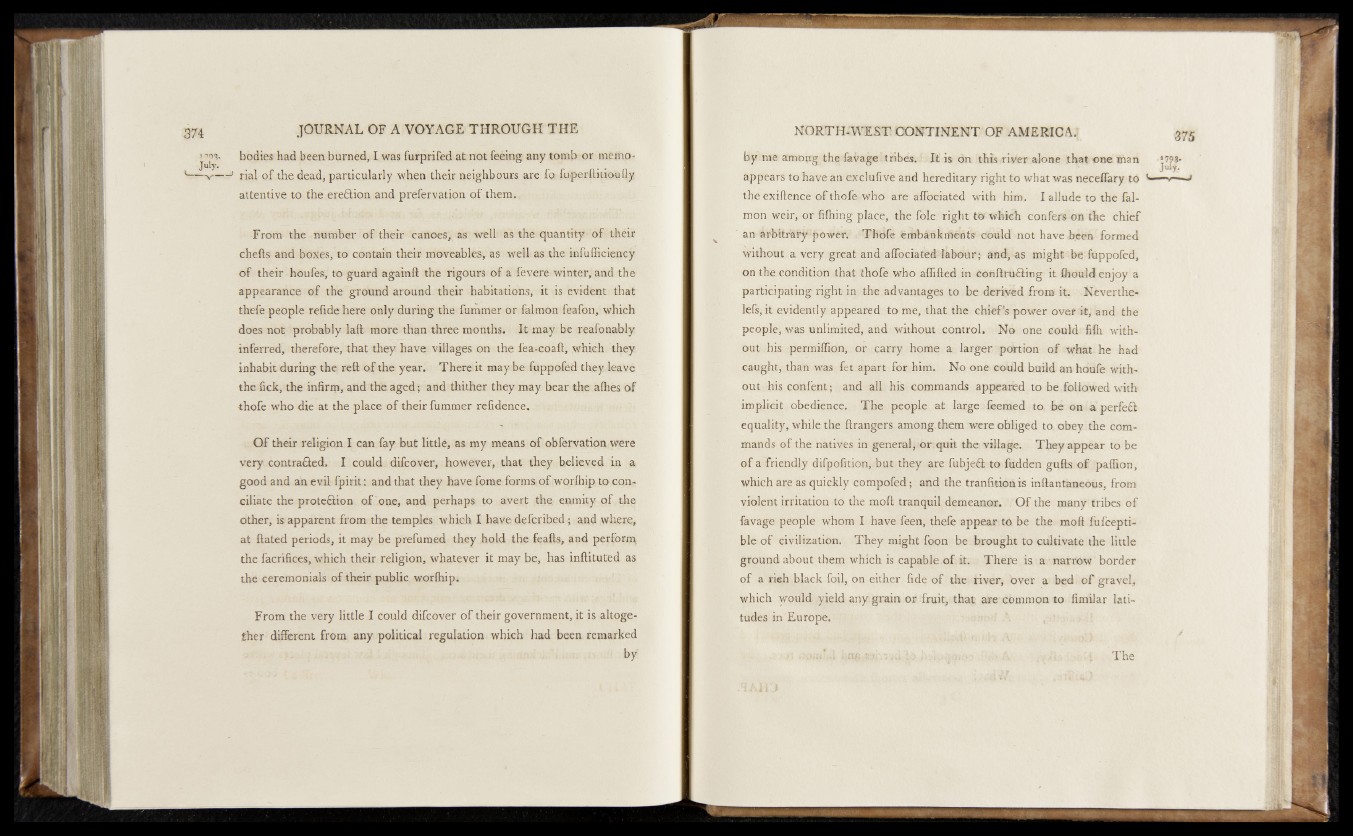
374 JOURNAL OF A VOYAGE THROUGH THE
?*w>8* bbdies- had been burned* I was furprifed at not feeing any tomb or mettio-
—>----0 rial of the dead, particularly when their neighbours are fq- fu-per-ftitibufly
attentive to,the»ere6Upnsand'prefervation of them.,
From die number -of'their canoes', as : welbaitfequanrity’ o f their
chefts- and boxes, to contain their moveables* as- well as the infufficiency
o f their hbufes* t©\guard againft .the
appearance of the ground around-their .habitatiohs, it is Evident that
thefe people refide here only during the* himmer or falmon feafon* which
does not probably laft more than three months. It mayshe reafo-nably
inferred, therefore, that they havep villages rm^thefbaMSoafti .which they?
inhabit during the- reft of the year. There it maybefuppofed theyleave
thefick, the infirm, and thbaged; and thither they-may bear th&alhesbf
-thofe who die at the place of their fummer refidence. \
O f their religion I can fay but little, as-my means qf obfervation.were
very contracted. I could $ difcover^ however, that they beljeyfd ip a,
good and an evil fpirit : and that they have fome:foFms!bf wQrfhipt<^c.qHj;
eiliate the prote&ion of one, and perhaps? to aivejif the/ enmity of the
other, is apparent from the temples which I have dsfeited* anywhere,
at ftated periods, it may be prefumed they hold the feafia, and perform
the facrifices, which their religion, whatever it may be, has inflituted as
the ceremonials of their public worftiip;
From the very little I could difcover of their government, it is altogether
different from any political regulation which had been remarked
» H
NORTH-AVEST CONTI N EN TO F AMERICA;
by m© atwopg the faiage? tribes.f It is dn this,river alone that one tfian
appears to have an-excluftve and hereditary right to what was neceflary tO
the exiftence of thofesWho -are affdeiated with him. I allude to the fal-
mon weir,-or ftfhing place, the foie right Whi<di confers on the chief
an ar-bltmrjA power, . Tffofe bihhanferbMts -c>bnld not have been formed
without a very great and affociatieddaboar; and, -as might be ftjppofed,
on the condition .that /thofe who aflifted in conftrofting it ft ould enjoy a
participating right' imtheadvantages to be derived from it. Neverthe-
lefs-, it-evidently appeared to me, that the chiefs power over-it, and the
people, was unlimited, and without control. ; No one could lift without,,
bis permiffion*. or cany home a larger, portion of what he had
was fet a part foil him. N© on© could build an houfe with-
q,ut.^his confept; and all, his commands appealed to becfollowed with
implicit obedience.,;-The people at large feemed to, be on aperfeft
equality, while the ftrangers among.them were obliged to. obey the commands
of the natives? in general,'Orquit the village. They appear to be
of a friendly difpofition,.but they are fubjefittofudden gufts o f pailion,
which are as quickly eompofed ; and thetranfi-rioU is inftantaneous, from
violent irritation to the molt tranquil demeans». O f the many tribes of
favage people whom I have feen, thefe appear to be the molt lufcepti-
ble of civilization. -They might foon be,brought to cultivate the little
ground about them which is capable .of: it. There is a narrow border
of a rieh black foil, on either fide of the river, bver a bed o f gravel,
which would yield any grain of fruit, that, are common to fimilar latitudes
in Europe.